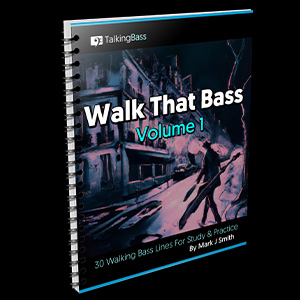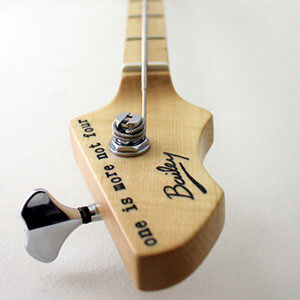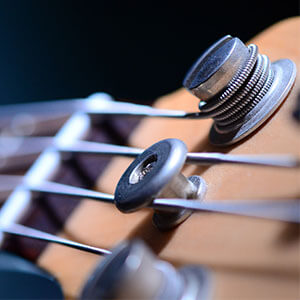
Before you embark on a career as a professional bass player you would be forgiven for thinking that you need to work on your ability to play anything that’s thrown at you. That’s how I thought and I’d say it’s definitely a good ethic to work by in your practicing and development. But it’s easy to lose sight of the fact that 99% of the stuff you will play as a professional is technically very straightforward or simple. For every bar of tricky syncopation or string of rapid semiquavers (16th notes) there are literally thousands of complete songs where you play less than 6 notes in any bar.
The REALLY simple stuff
Now, in no way am I preaching an anti-technique or ‘keep it simple’ point of view. Every piece of music is different and I thought it would be quite obvious to any musician that you need to be prepared for all circumstances. But it’s rare we actually prepare for the REALLY simple stuff and the problems it can create on stage, especially in high pressure or exposed gigging environments. When I say simple, I’m not talking ‘slow’ because playing very slow can bring certain difficulties in timing that need obvious practice. And I’m not talking about ‘groove’ either because that’s another obvious skill that can be practiced and built on with experience.
The playing I’m referring to can best be described with an example from my own library of personal bass cock-ups. Many, many moons ago I was in a theatre show band backing a typical female cabaret act in front of a full house. The band had a brief look through the sheet music before the show and it all looked fairly straightforward. After a string of popular uptempo hits of yesteryear, we came to a slow ballad in the annoying key of G flat. After 16 bars of nothing, I was due to come in on the subdominant (chord IV) which, in the key of G flat, is a C flat. Surprise, surprise, I let my mind wander during the 16 bars and then stupidly came in on a C natural. At the point of this huge faux pas, the band was cut down to keys and vocals and I had to join in on this very exposed section. As you can imagine, I instantly recognised the problem, along with 800 paying audience members, and proceeded to crawl up my own arse and out again before attempting to subtly move down a semitone while making it appear intentional. Something you can also imagine as impossible.
Concentrate, you idiot!
Learned lesson number one was that I should have been concentrating. Even though the song was in an uncommon key, having 16 tacet bars to look ahead through the piece means there is no excuse. But the most important point I’m making is that the song was one I would have considered laughably easy. Especially from a technical standpoint. Each note I had to play in the tune lasted a full bar and the only thing I had to think about was getting the key right.
Never take simplicity for granted. An audience will be more forgiving of errors in a technically demanding piece of music but could possibly laugh or throw manure at errors in an easy song so it pays to nail the simple stuff. In fact, the faster and more complex a run of notes, the less likely an audience is to hear the wrong ones. In exposed sections of music when the lights are hot, you’re sweating, the bass is prominent and the audience is hanging on every note of a beautiful performance, those long bass notes need to be played with both rhythmic conviction and dynamic subtlety and the pressure can bring about all kinds of stresses as you stare at the next note in line hoping you’ve taken everything into account.
A few tips
Of course, there’s no realistic method for practicing this kind of scenario because it’s simply a matter of circumstance and you never know how you will react when the pressure’s on. However, there are a couple of tips I can pass on.
One: Try not to relax too much. Thrashing through a fast number with lots of notes and complicated sections will naturally hold your attention and force you to concentrate whereas a long ponderous drudge might bring on bouts of tiredness bordering on narcolepsy. Your attention will wander and daydreaming on an important gig is likely to end in a bass disaster.
Two: Be prepared. If you are sight reading, ensure you go over the roadmap, the key changes and any other idiosyncrasies before the show and in the seconds leading up to the countoff. If playing from memory, spend time devoted to the smaller details no matter how inconsequential they might seem.
Ballads or slow, sparse musical compositions can be the most dangerous examples of this pressured simplicity. Longer held notes will expose weaknesses in your overall musicianship with much more brutality than uptempo riffs that pass by every few seconds and it’s this overall musicianship that is the key.
Practice Music
In developing your musical craft it pays to practice music first and bass, or certainly bass technique, second. The more rounded your musical knowledge and experience, the more confident a musician you will become and, in gigging situations, confidence can be a major factor in avoiding stupid mistakes as non-musical factors and the chaos of live performance start to distract. You will also begin to play music from a different perspective. Instead of solely hearing and playing a bass part, you should strive to hear the arrangement and composition as a whole.
It’s no coincidence that a lot of the top session players and go-to guys are multi instrumentalists with a wide palette of musical skills such as composing and arranging. Marcus Miller is a perfect example. Marcus can produce, compose, arrange and is proficient in a multitude of string and woodwind instruments. The majority of good bass players also have good keyboard skills and can usually play drums and guitar to an adequate level. This all round musicianship adds more to your bass playing than any amount of technical exercises or flamboyant slap solos.
Have some RESPECT
This all brings us back to the concept of nailing the simple stuff. If you are thinking from a music perspective as opposed to a bass perspective, you are more likely to apply the same dedicated concentration to the arrangement as a whole rather than selfishly zoning in on your own part. If I had been listening and respecting the song as a whole, I would have been aware of my musical surroundings and paid attention to the details of my bass entry rather than arrogantly assuming that a musically sparse ballad will present less pitfalls than the previous songs of a more intricate nature. Also, in really listening to the whole song, I would have mentally been on the stage and in the moment, rather than scratching my arse and subconsciously transporting home to a decision on whether to order Chinese or Indian takeout.
So the next time you are on a gig and you want to impress the hot girl in the front row, don’t waste your time thinking too much about the super fast run you get to play in the next song. Concentrate on the here and now and nailing the simple stuff. You might just find the tricky stuff flows more easily when it comes from a secure foundation.













Thank you for this excellent article,Mark(?). Even though I`m about as far from away from a *r-e-a-l* bass player it`s almost obscene (self-taught hobby player here),I take this topic most seriously.Some of the most enjoyable and most genuine basslines are “easy” or “simple” technically speaking that is…I`ve always liked that proverb “Less is more.” –especially when applied to bass (Our de facto motto,I guess.).Recently I had the embarrassing,disheartening experience of playing some “simple” tunes for misc. family members.*Needle scratch* It was a train wreck and I “proceeded to crawl up my own arse and out again”.(You coined a fine phrase,sir!) The worst part is that you`re bound to be viewed as less serious,committed,competent and rather the proverbial “polished turd” of the month.Take whatever you learning,have learned or learned and forgotten to heart and do your best!
Sorry for the lecture!
Hos
You are so right Mark..I could not agree with more..that has happened to me before..staying focused and nailing the simple tunes and not just taking it for granted..on slow simple tunes when the bass player plays the wrong note…it really stands out…your blood pressure go’s up…lol..
Oh this is priceless. LOL
Well written Mark excellent article.
And I thought it was just me getting anxious at these ‘simple tunes’. Great article. Thank you.
Great artcicle Mark…..The ‘Simple Ones’ can really cause us to take things for granted n slip up….
A simple phrase that I use that helps me while practicing contains a lot of wisdom, “Do not practice until you get it right; practice until you cannot get it wrong”. I keep this in mind every time I practice and finds that it pushes me to keep practicing when I am tired and want to quit. After awhile you will find that your playing comes second nature and pretty much without thinking about it.
Great article with a message that applies in all endeavors requiring concentration. The worst ski fall I ever had was when I was on an almost flat trail connecting one section of the course to another. It wasn’t the “real” ski run. I wasn’t paying attention to the simple stuff and wiped out spectacularly.